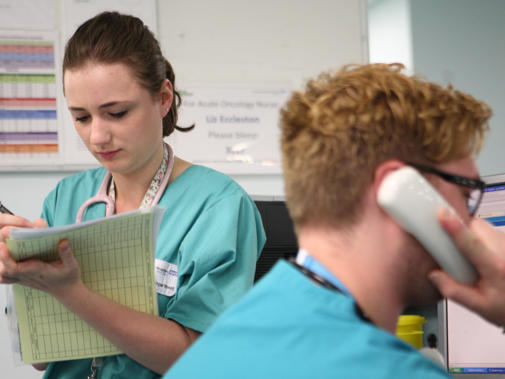Junior doctors at Hull University Teaching Hospitals NHS trust will now receive up to four hours each week of ring-fenced time for portfolio work and independent study.
The decision comes following efforts led by Dr David Smith – a specialty trainee 3 in primary care and member of the BMA’s Yorkshire regional council.
Under the terms of the arrangement, each junior doctor gets to decide how and when they schedule the time in their rotas, for example four hours each week or eight hours every fortnight, with Dr Smith explaining this needs to be arranged with a trainee’s clinical supervisor at the start of a placement.
He said: ‘Having this provision means that, as junior doctors, we’re not having to finish a day’s work, drive home and then have to sit at home finishing an audit, writing up reflections or completing e-learning.
‘It means that when you finish your work, the time after that is your time [and] after everything we’ve gone through with COVID-19, that personal time is more important than ever.’
Time to develop
As part of a report by Foundation Programme review, Health Education England states that all foundation year 1s and 2s should respectively receive one hour and three hours a week of non-clinical, professional self-development time in their work schedules.
In securing these changes at his trust, Dr Smith said it was vital that began putting recommendations into practice by ensuring that junior doctors’ work schedules included protected development time.
‘Now that this precedent has been set, hopefully we will start to see other trusts following suit. Every doctor across the country should be getting the same provisions that we in Hull are.’
Dr Smith said that discussions within the trust’s junior doctors forum around the issue of missed educational opportunities first began in October last year, and gathered pace once the demands of the pandemic began to take hold.
After carrying out a number of surveys to determine how much time trainees were receiving each week for training and portfolio work, the trust agreed to insert a new provision into all trainees’ work schedules, ensuring that everyone receives a set amount of time each week dedicated to independent study.
He said: ‘In the very early days of COVID-19, when there was a lot of confusion, trainees were quite rightfully quite concerned they were suddenly having to work all these extra hours without being given time to get educational and e-portfolio work done.
‘We had to really think on our feet about how services would be delivered. Junior doctors stepped up to the plate and took on some quite prominent leadership roles, and that meant that it was easier to explore ideas with the trust as to how we could make things better.’
Open and listening
Dr Smith said that, for GP trainees such as himself, working in hospital settings could be an isolating experience in which trainees were separated from their colleagues in primary care.
By having half-a-day a week of protected time, he said that GP trainees could reconnect with their training programmes.
He added, however, that having protected time within weekly work schedules was important for all trainees, as it meant they would not have to sacrifice their personal time for their professional development.
Dr Smith said that credit for the changes also had to be given to a number of figures at the trust including the director of medical education Helen Cattermole and employee service centre managers Richard Horner and Joey Robson.
He said: ‘The trust was really open to listening to us, and they really pulled out the stops in trying to get these changes done for us.’

